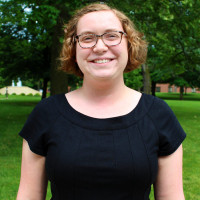The UB Legacy
My family knew little about the Church of the United Brethren in Christ when I visited Huntington University as a prospective student. Nevertheless, my Christian parents and I were confident that HU would support my spiritual growth. I know now that our reasons for that confidence had much to do with HU’s relationship with the United Brethren (UB) denomination.
I’ll explain. But first, a little history:
The Church of the United Brethren in Christ founded Central College (now called Huntington University) in 1897. Our earliest leaders were UB members, many of them ministers and bishops. These early presidents, board members, and faculty members sought to educate men and women for lives of Christian service, whether they became pastors or teachers, agrarians or musicians. They invited UB parents to send their children to receive an education that they could trust because it was rooted in the same principles the UB denomination was founded upon, including the resurrection of Christ, the authority of Scripture, and the brotherhood of believers.
Certainly, Huntington University owes its beginnings to the United Brethren. I could tell you countless stories of UB members in our 125-plus-year history who have left a legacy here. But I didn’t know any of those stories when I first visited Huntington University.
So how did I know I could entrust HU with my spiritual formation?
Years ago, when my mom took me to my elementary school to enroll me in kindergarten, the generic inspirational posters adorning the hallway caught my attention.
“Will I learn about God here?” I asked.
“Probably not,” Mom said. “Are you okay with that?” My parents had considered sending me (their firstborn) to a Christian school but ultimately decided on public school. My innocent question rattled my mother’s resolve.
I thought for a moment before replying. “I guess so. I’ll learn about God at church.”
We never had to ask “Will I learn about God here?” at Huntington University. The vaguely motivational posters of my elementary school were replaced with HU’s Statement of Faith, Community Life Agreement, and Verse of the Year. I visited chapel services and sat in on classes and came away feeling encouraged in my faith. I met professors and students and saw their genuine certainty that God was at work at Huntington University.
How did I know I could entrust HU with my spiritual formation? Because I saw evidence that Christ was central to Huntington University’s identity. Now I know that HU’s Christ-centered legacy comes from the University’s earliest beginnings in the UB denomination.
Huntington University has been a self-owned institution since the early 1960s. Nevertheless, our continued ties to the United Brethren denomination remind us who we are. For example, a UB leadership team, including the Bishop of the US National Conference, always sits on the HU Board of Trustees alongside Trustees from other excellent denominations. And in recent years, UB members and HU experts in various disciplines have collaborated on task forces to address some of the toughest concerns of our generation.
Today, to say that the United Brethren denomination is the University’s parent denomination is not truly accurate, and it doesn’t do justice to the reciprocal relationship that benefits us both. The relationship that brought my family to Huntington University. Although we didn’t know much about UB specifics, we saw faith lived out in the people we met on visit days and in the materials I received from HU.
As an HU employee, I help write those materials, so I know the same roots in Christ that I noticed then are permeating what we do now. I teach classes that carry on the tradition of my own HU education. And I annually sign my name to the same Statement of Faith that all Huntington University employees sign year after year.
I still don’t attend a United Brethren church, but that is absolutely not a reflection on the denomination — I simply landed somewhere else. I’ve spent the last decade of my life witnessing firsthand the connection between Huntington University and the Church of the United Brethren in Christ, and I am even more encouraged now than I was years ago.
The UB legacy at HU is Christ. For that, I am truly thankful.

